UFA GmbH, shortened to UFA, is a film and television production company that unites all production activities of the media conglomerate Bertelsmann in Germany. The original UFA was established as Universum-Film Aktiengesellschaft on December 18, 1917, as a direct response to foreign competition in film and propaganda. UFA was founded by a consortium headed by Emil Georg von Stauß, a former Deutsche Bank board member. In March 1927, Alfred Hugenberg, an influential German media entrepreneur and later Minister of the Economy and Minister of Agriculture and Nutrition in Adolf Hitler's cabinet, purchased UFA and transferred ownership of it to the Nazi Party in 1933.
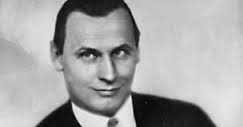
Fritz Heinrich Rasp was a German film actor who appeared in more than 100 films between 1916 and 1976. His obituary in Der Spiegel described Rasp as "the German film villain in service, for over 60 years."
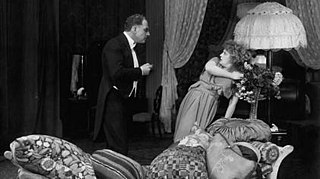
The Wandering Image is a 1920 German silent drama film directed by Fritz Lang and starring Mia May, Hans Marr and Rudolf Klein-Rogge. It is also known by the alternative titles of The Wandering Picture and The Wandering Shadow.
Catherine the Great is a 1920 German silent historical film directed by Reinhold Schünzel and starring Lucie Höflich, Fritz Kortner, and Fritz Delius. The film was an epic portrayal of the life of Catherine the Great of Russia. 4,000 extras and 500 horses were used.

Uncle Bräsig is a 1936 German historical comedy film directed by Erich Waschneck and starring Otto Wernicke, Heinrich Schroth and Harry Hardt. It marked the film debut of the Swedish actress Kristina Söderbaum who went on to be a major star of Nazi cinema. Söderbaum won her part in a contest organised by UFA. It was based on the 1862 novel From My Farming Days by Fritz Reuter. The film was shot at the Grunewald Studios in Berlin with sets designed by the art director Robert A. Dietrich.
The Mirror of the World is a 1918 German silent film directed by Lupu Pick and starring Adolf Klein, Fritz Richard and Gertrude Welcker. It was the directoral debut of Pick who had been a prominent actor of the 1910s but had set up his own production company Rex-Film to take advantage of the booming German film industry. It was shot in Berlin. The film's art direction was by Hans Neirath.
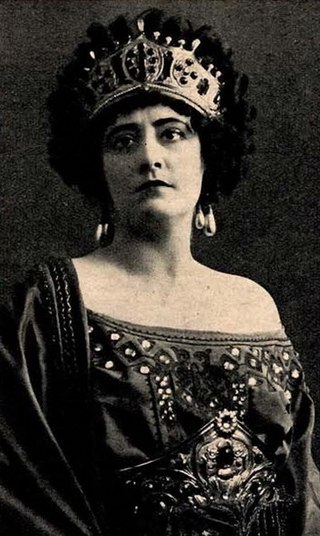
Rina De Liguoro was an Italian film actress. Born Elena Caterina Catardi, she changed her name after marrying film actor and director Wladimiro De Liguoro in 1918. She appeared in leading roles in a number of Italian epics during the 1920s such as The Last Days of Pompeii. She later appeared in character roles after an unsuccessful spell in Hollywood. Her final film was Luchino Visconti's The Leopard.
Lola Montez, the King's Dancer is a 1922 German silent historical drama film directed by Willi Wolff and starring Ellen Richter, Arnold Korff, and Fritz Kampers. It portrays the life of Lola Montez. The film was produced by Richter's own production company, but was released by the dominant German distributor UFA.

Wood Love is a 1925 German silent comedy film directed by Hans Neumann and starring Werner Krauss, Valeska Gert and Alexander Granach. It was an adaptation of William Shakespeare's A Midsummer Night's Dream.

Revolt in the Reformatory is a 1929 German silent drama film directed by Georg Asagaroff and starring Carl Balhaus, Vera Baranovskaya, Toni van Eyck. The film was based on a play by Peter Martin Lampel intended as an exposé of the youth justice system. The film was considered controversial, and was banned four times before its eventual release. The film's art direction was by Andrej Andrejew.

Man Against Man is a 1928 German silent thriller film directed by Harry Piel and starring Piel, Dary Holm and Fritz Beckmann.
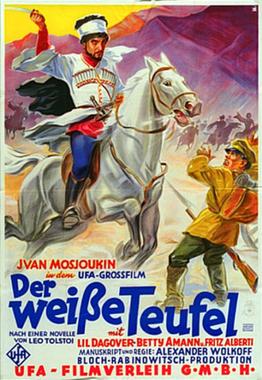
The White Devil is a 1930 German historical drama film directed by Alexandre Volkoff and starring Ivan Mozzhukhin, Lil Dagover and Betty Amann. It was based on Leo Tolstoy's 1912 novella Hadji Murat. It was originally made as a silent film, with a soundtrack added later. Anatole Litvak worked as the film's assistant director and production manager. It was shot at the Babelsberg Studios in Berlin. The film's sets were designed by the art directors Alexandre Lochakoff and Vladimir Meingard. After location shooting in Nice, Switzerland and the French Alps during 1929, it premiered at the Ufa-Palast am Zoo in January 1930.
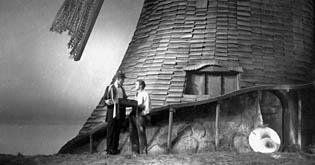
At the Edge of the World is a 1927 German silent drama film directed by Karl Grune and starring Albert Steinrück, William Dieterle and Brigitte Helm. It was shot at the Babelsberg Studios in Berlin. Robert Neppach oversaw the film's art direction and designed the sets. The film was so heavily cut by the management of UFA that Grune tried to have his name removed from the credits and publicly criticized them in an open letter.
The Prince of Rogues is a 1928 German silent drama film directed by Curtis Bernhardt and starring Hans Stüwe, Lissy Arna and Albert Steinrück. It was shot at the Johannisthal Studios in Berlin. The film's art direction was by Heinrich Richter. The story depicts the life of the 18th century outlaw Schinderhannes. It is based on a 1927 play Schinderhannes by Carl Zuckmayer.

The Mystery of Betty Bonn is a 1938 German adventure film directed by Robert A. Stemmle and starring Maria Andergast, Theodor Loos and Hans Nielsen. The film was shot at the Babelsberg Studios in Berlin with sets designed by the art directors Wilhelm Depenau and Ludwig Reiber. It was made by the leading German company UFA, based on a novel by Friedrich Lindemann.

Fee Malten (1911–2005) was a German film actress, who later emigrated to the United States. Born in Berlin as Felicitas Mansch, Malten appeared as a leading lady in both silent and sound films of the late Weimar era. Due to her Jewish background, she was compelled to go into exile following the Nazi takeover in 1933. She eventually settled in the United States where she continued to act, generally in much smaller parts than she had received in Germany.

Poison Gas is a 1929 German silent drama film directed by Mikhail Dubson and starring Hans Stüwe, Lissy Arna and Alfred Abel. It is based on the play Poison Gas over Berlin by Peter Martin Lampel. The film's sets were designed by the art director August Rinaldi.
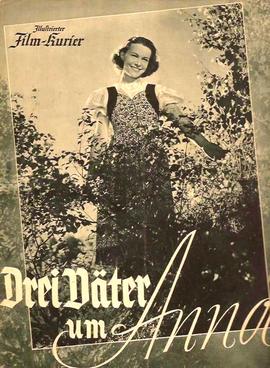
Three Fathers for Anna is a 1939 German comedy film directed by Carl Boese and starring Ilse Werner, Hans Stüwe and Theodor Danegger. It was made by the German company UFA at the firm's Babelsberg Studios in Potsdam, with some location shooting taking place around Passau in Bavaria. The film's sets were designed by the art director Herbert Frohberg.
Nights of Terror is a 1921 German silent horror film directed by Lupu Pick and starring Edith Posca, Alfred Abel and Arnold Korff.

Hans Trutz in the Land of Plenty is a 1917 German silent fantasy film directed by and starring Paul Wegener and also featuring Lyda Salmonova and Ernst Lubitsch. It was one of a trilogy of fairytale-inspired films made by Wegener, along with Rübezahl's Wedding and The Pied Piper of Hamelin.














